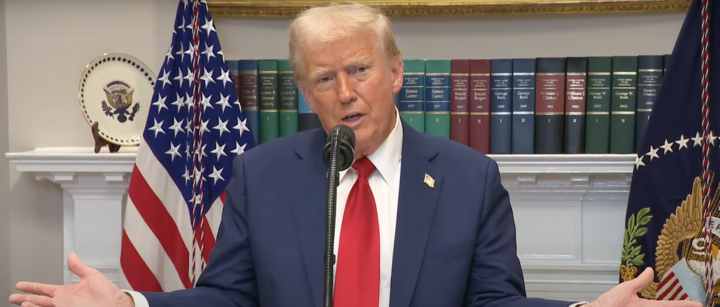Listen to the article
In a pattern echoing his previous term, President Donald Trump has repeatedly touted massive investment figures flowing into the United States since his return to office. Starting with claims of $3 trillion on his first full day back in the White House, Trump has progressively increased these figures, recently declaring investments of more than $10 trillion.
“Before the end of my first full business day in Washington in the White House, we’ve already secured nearly $3 trillion of new investments in the United States,” Trump stated on January 21. By March, he cited $5 trillion, and by May 8, claimed “we’ll be close to $10 trillion of investment.”
These impressive figures, however, appear to be significant exaggerations of actual investment pledges. The White House itself has documented approximately $6 trillion in commitments as of May 19, with $2 trillion from corporate announcements and $4 trillion from foreign countries promising future investments.
A closer examination of the White House’s “running list” reveals several questionable inclusions. For instance, OpenAI’s $500 billion Stargate artificial intelligence infrastructure project was reportedly in planning stages since early 2023, before Trump’s election victory. While an OpenAI spokesperson told the Washington Post that “this deal at this magnitude only came together following the election,” they also confirmed discussions about the project had been ongoing for at least 10 months prior to Trump taking office.
Similarly, Stellantis’ decision to reopen its Belvidere Assembly plant near Chicago has multiple parties claiming credit. While Stellantis Chairman John Elkann met with Trump in January shortly before announcing the reopening, both the United Auto Workers union and Illinois Governor JB Pritzker, a Democrat, have also claimed their efforts were instrumental in securing the plant’s revival.
Foreign investment pledges listed by the White House also contain substantial ambiguities. Japan’s “$1 trillion investment” announcement actually represents an expansion of existing investments, which stood at $783 billion in 2023. Prime Minister Shigeru Ishiba’s statement about elevating investment “to an unprecedented amount of $1 trillion” would therefore represent an additional $217 billion – far less than the full trillion being counted.
Economic experts caution against taking these investment announcements at face value. “There’s no guarantee that any of the investments that are announced actually come to fruition,” said Adam Hersh, senior economist at the Economic Policy Institute. “Until they actually happen, it’s just a lot of hot air.”
Scott Lincicome from the Cato Institute echoed these concerns, noting many announcements are “just promises—and often vague ones at that,” with few specifics about project timelines or details.
The practice of companies making favorable announcements when a new administration takes office is well-established, according to Nick Nigro, founder of Atlas Public Policy. “Companies often will make announcements to essentially curry favor with an incoming administration to show how committed they are to the United States,” he told CBS News.
Many pledged investments are also spread over multiple years, not immediately realized. For context, the U.S. recorded $3.5 trillion in non-residential investment for all of 2023, a record year for manufacturing facility construction, according to Bureau of Economic Analysis data.
The White House did not respond to requests for detailed accounting of the investments contributing to Trump’s increasingly large figures. Since May 6, the administration has maintained what it describes as a “non-comprehensive” list of new U.S. investments announced during Trump’s second term.
While investment announcements can indicate business confidence, the disparity between Trump’s claims and verifiable commitments raises questions about the accuracy of the administration’s economic messaging. As actual investments materialize over time, a clearer picture will emerge of how many of these announced projects ultimately contribute to American economic growth.
Fact Checker
Verify the accuracy of this article using The Disinformation Commission analysis and real-time sources.




9 Comments
The discrepancy between Trump’s statements and the actual investment figures is concerning. It’s important that the public has accurate information on the state of US investments, not exaggerated claims.
It’s troubling to see the White House potentially padding investment figures with questionable projects. Transparency and accountability should be the top priorities when it comes to economic data.
Investors and the public deserve clarity on the real state of US investments. Exaggerations undermine confidence and make it difficult to assess the true economic climate.
Precisely. Credible data is key for informed decision-making by both businesses and consumers. Inflated numbers only serve to mislead and distort the reality on the ground.
While some investment commitments have been made, it’s troubling to see the White House including questionable projects in their tally. Transparency and honesty are crucial for public trust.
This report is a sobering reminder that we must scrutinize political rhetoric, especially around economic claims. Fact-based analysis is essential to cut through the noise and understand the true state of US investments.
This report highlights the need for rigorous fact-checking and scrutiny of political rhetoric, especially when it comes to economic claims. Responsible reporting is essential to hold leaders accountable.
I agree, it’s critical that the media and public maintain a skeptical eye towards unsubstantiated figures. Fact-based analysis is the only way to get an accurate picture.
The discrepancy between Trump’s statements and the actual investment figures is concerning. Responsible reporting and rigorous fact-checking are crucial to hold leaders accountable and provide the public with accurate information.